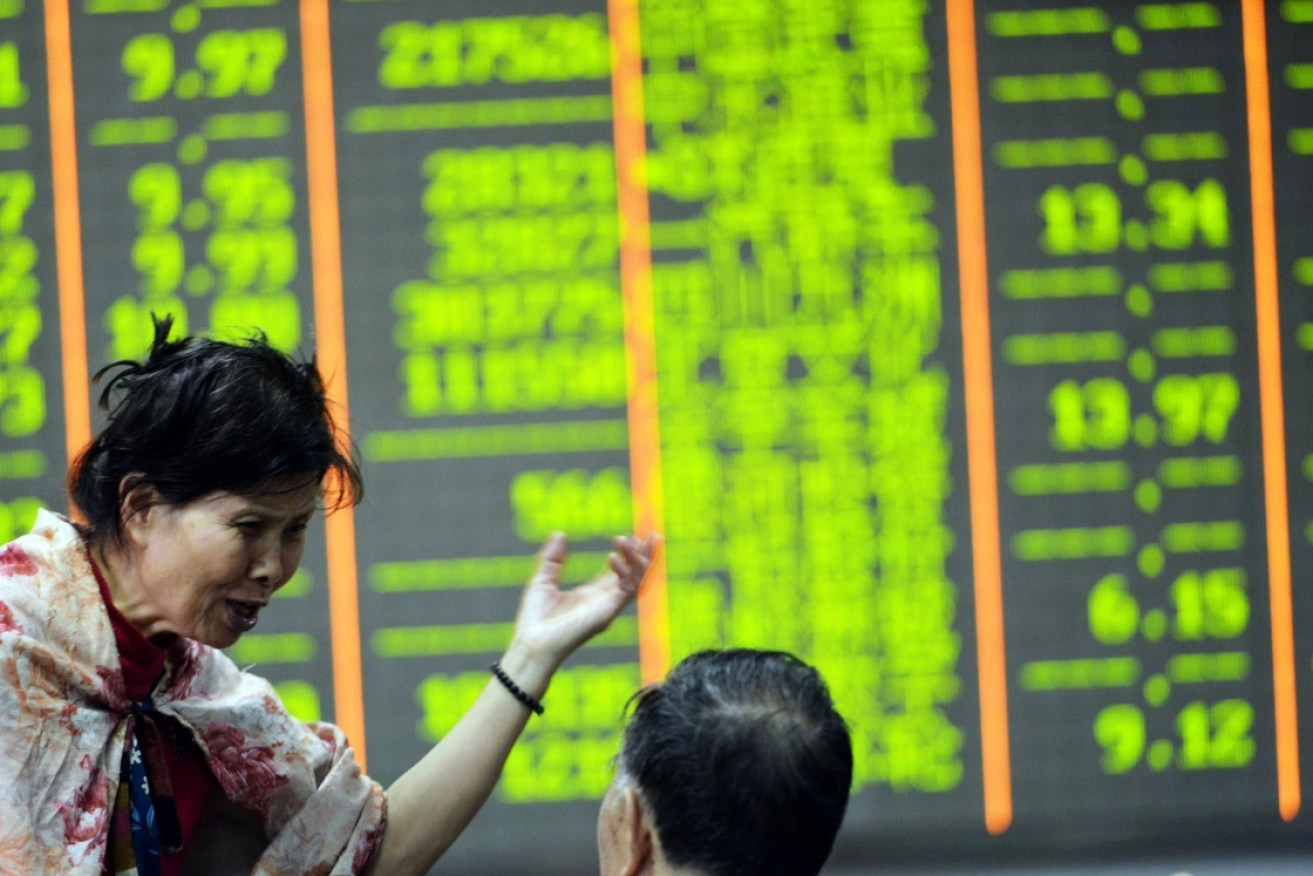Asian markets in freefall after China’s big losses

Australian investors are braced for more big losses on the ASX after the Shanghai and Hong Kong markets were crunched by another bout of frantic selling on Wednesday.
The Shanghai stockmarket – the world’s third-largest – tumbled by six per cent on Wednesday, triggering the suspension of almost half of the exchange’s listed stocks.
In Hong Kong, the rout was equally savage where the Hang Seng Index plummeted by six per cent.
• Your wage is about to be worth less. Here’s why
• ASX slumps as China mess unfolds
• No change: RBA keep rates on hold
The rising risk of an economic downturn in China could have flow-on effects for Australian jobs in industries such as mining, food processing and higher education.
The profitability of these local industries is closely linked to Chinese demand.
The negative sentiment emanating from Shanghai hit most other Asian markets with Japan and Taiwan each closing down three per cent.
Australian traders responded to the Chinese selling frenzy soon after the Shanghai market opened, driving down the value of the ASX’s top 500 stocks by an average of two per cent.
The key local market indicator, the S&P/ASX 200 index slumped 111.9 points to close at 5469.5.
Miners such as Fortescue Metals (down six per cent), BHP (down three per cent) and Rio Tinto (down 3.2 per cent) were among the hardest hit local stocks as fears of an economic downturn in China wiped five per cent from the iron ore price.
CommSec analyst Tom Piotrowski attributed the local slide entirely to fallout from Shanghai.
“It has been a dispiriting day for the Australian sharemarket,” Mr Petrovski said.
“The main reason for the declines was the performance of the Chinese stockmarket.”
Chinese government measures backfire
On Monday the Chinese government imposed a raft of measures to stabilise the Shanghai market, including an extraordinary decree that required stockbrokers to buy stocks.
The government also placed a temporary ban on new stockmarket listings and opened cash support for banks that had financed margin loans to investors now in trouble.
However, the intervention seems to have backfired badly and compounded the panicked selling that took hold of the Shanghai exchange in the second week of June.
Wednesday’s big fall means that the Shanghai Composite has lost almost 32 per cent of its value since the beginning of June.

The Shanghai Composite Index has been declining for weeks. Photo: Bloomberg
One of the most worrying features of the Chinese government’s intervention was the incentive it has thrown to insurance companies to invest in the Shanghai exchange.
Under the new measures insurers can buy up to 10 per cent of the issued stock of any Chinese-listed company.
This could create capital problems for state-owned insurers if the bear market continues.
Mr Piotrowski said the actions taken by Chinese authorities were a “bone of contention” and may have contributed to further destabilisation of markets in Shanghai and the Asian region.
“They (the Chinese authorities) have thrown a lot of initiatives at trying to stabilize the Chinese stockmarket but at face value it seems to have counted for very little,” he said.
“That’s what has been destabilising other markets in the region.”
Implications for Australia
If the collapse of the Shanghai market is a harbinger of declining economic activity in China, there are likely to be deep impacts on Australia.
Already, the instability of the Shanghai exchange has produced a marked impact on commodity prices, particularly iron ore and base metals.
This will increase pressure on mining companies to cut their workforces and capital expenditure.

Iron ore export volumes are expected to keep rising, but prices have slumped.
The sharp slide in commodity prices is also driving down the Australian dollar.
The Aussie dollar slipped below 74 US cents for the first time in seven years on Wednesday in response to the commodity price falls.
However, it also lost ground against most other major currencies, including the Euro, the Japanese Yen and the New Zealand Dollar.
While a lower Australian exchange rate will make it easier for Australian exporters to compete in international markets, it means that the cost of buying imported goods such as televisions, iPhones and computers is likely to increase.
The cost of taking an international holiday will also rise because the lower dollar diminishes the purchasing power of Australians when they are overseas.
Impact on super returns
If the declines on Asian sharemarkets are sustained in coming months, super fund members are likely to see returns on their exposures to international shares take a hit.
International shares have outperformed most other asset classes in the last year, with some overseas investment options offered by super funds returning above 20 per cent.
It is hard to see how such returns can be maintained in the near term when one considers that most other international exchanges, including Wall Street, have also posted losses in the past month.
However, the sliding Australian currency is likely to limit the size of those losses for super fund members who invest a portion of their retirement savings in overseas share funds that do not hedge against currency movements.








